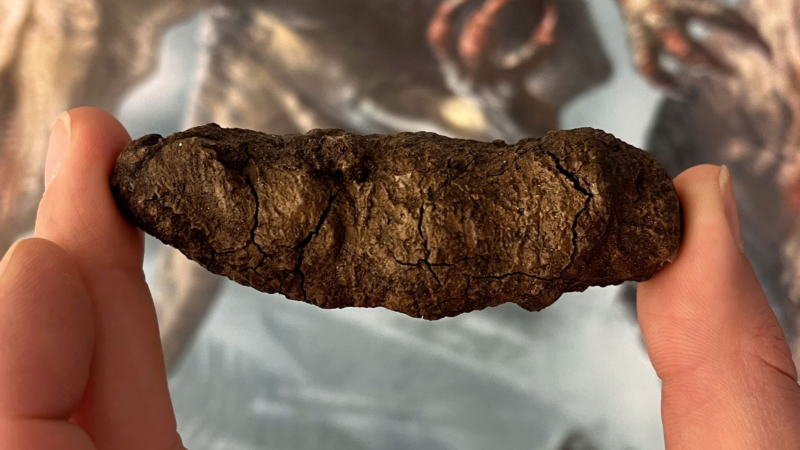Over 500 fossilized poops show how dinosaurs came to rule the Earth
Researchers have conducted what could be the largest study ever of dinosaur poop. The findings shed new light on how dinosaur’s diets allowed them to dominate the planet.
The analysis of hundreds of fossilized droppings (plus a little bit of petrified vomit) from roughly 230 million years ago shows that dinosaurs persevered because they were not picky eaters.
“The first dinosaur ancestors were opportunistic,” says Martin Qvarnström, a paleontologist at Uppsala University in Sweden, who led the study. “They were eating insects, fish, plants — everything that they came across.”
Ultimately, he says, over millions of years, that dietary flexibility allowed them to rule the Earth.
Rise of the dinosaurs
The end of the dinosaurs is well known: A giant asteroid came down and wiped them out. But how did they get their start?
“We know a lot about the life and extinction of the dinosaurs, but not so much the rise of the dinosaurs,” Qvarnström says.
At the beginning of the Triassic period, dinosaurs were one of many lizards roaming the Earth. “Most of the animals in the ecosystem were the various relatives of crocodiles,” Qvarnström says.
But by the end of the Triassic, around 200 million years ago, things had changed quite a bit. Dinosaurs became the dominant species, and other animals took a back seat. There were various theories as to why, but no smoking gun, like an asteroid, to explain their rise.
Enter Qvarnström, who specializes in dinosaur droppings. A few years ago, he and his colleague Grzegorz Niedźwiedzki were analyzing a small number of the droppings, known as coprolites. They started noticing little traces of what the dinosaurs had eaten inside slices of the samples.
“As it turned out, all of our samples contained undigested food residues,” he says.
A fish scale here, an insect there — each dropping was a tiny window into what was on the menu. With enough poop, he realized, it might be possible to reconstruct the entire food web from the period when dinosaurs rose to power. He and his colleagues assembled a collection of samples from the Polish Basin in Central Europe. They gathered all the fossilized poop they could, from dinosaurs and other animals as well. They ended up with over 500 samples.
“That’s a lot of poop,” Qvarnström says.
The poop was exhaustively analyzed by a research team of more than a dozen scientists using advanced techniques, and even a synchrotron particle accelerator, to probe each piece of excrement down to the molecular level.
The results were published this week in the journal Nature. They show that while other lizards at the time were focused on one type of plant or other food source, dinosaurs were eating lots of stuff.

A shifting climate
And that mattered, because during the late Triassic, a giant supercontinent called Pangea was breaking apart. Oceans were forming, volcanoes erupted violently and the climate underwent dramatic shifts. “Dinosaurs were really quick to adapt to the new conditions, whereas the previous more specialized animals had a tougher time,” Qvarnström says. Over the course of around 30 million years, he says, dinosaurs became the dominant species on land.
Lawrence Tanner, a professor of environmental science at Le Moyne College in Syracuse, N.Y., says interest in fossilized coprolites goes way back.
“People have collected and classified coprolites for decades, even hundreds of years,” he says. “But no one has studied them in this detail before.”
Tanner, who was not involved in the study, applauds the new work, but says it looks at only poo from what is modern-day Central Europe. “What we need now is to try to see if we can see the same sorts of transitions between animal groups at other locations,” he says.
In other words, scientists need to study even more fossilized poo.
Qvarnström says he’s hoping to have a long career that will remain, at least sometimes, focused on coprolites. “I think it’s really cool and an underestimated part of paleontology,” he says.
Alabama man charged in September mass shooting faces more murder charges in July quadruple homicide
Damien McDaniel has been arrested and charged with capital murder in connection with the July 13 mass shooting outside of a nightclub in Birmingham that left four people dead and 10 others wounded.
Traffic citations against Miami Dolphins star Tyreek Hill are dropped
Tyreek Hill of the Miami Dolphins was cited for careless driving and failure to wear a seat belt in September. The citations were dismissed after the officers involved did not appear in court.
More deals, more spending: What Black Friday has in store
This holiday shopping season is poised to break spending records. A new survey finds people plan to spend $771 on average.
PHOTOS: A drone’s eye view of ‘foodscapes,’ from cattle to soybeans to shrimp
Traveling to 36 countries and 5 oceans, George Steinmetz (and his drones) take us on a food tour in his new book Feed the Planet: A Photographic Journey to the World's Food.
Our 2024 holiday movie guide has you covered, from Hanukkah to ‘Hot Frosty’
Grab your blanket, your cocoa, your snuggler of choice – holiday movie season has arrived. Here's a rundown of the standard and not-so-standard offerings you'll find on TV this year.
After turkey, take a trot. A little post-meal walk can be a big boost for health
Among the latest health hacks to go viral on TikTok is the idea of short post-dinner "fart walk" to aid digestion. Turns out, the science on this trend is solid, and so are the health benefits.






